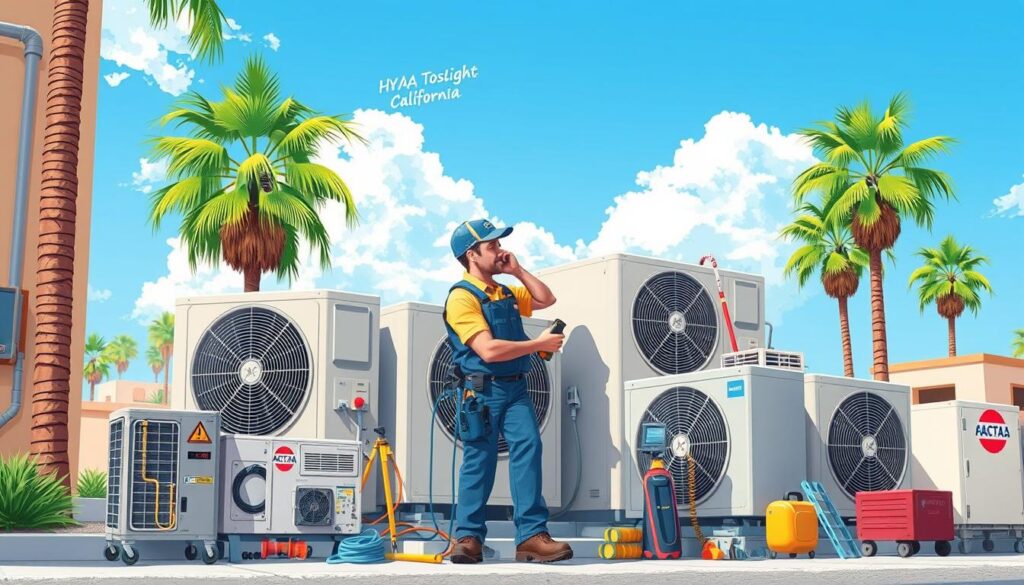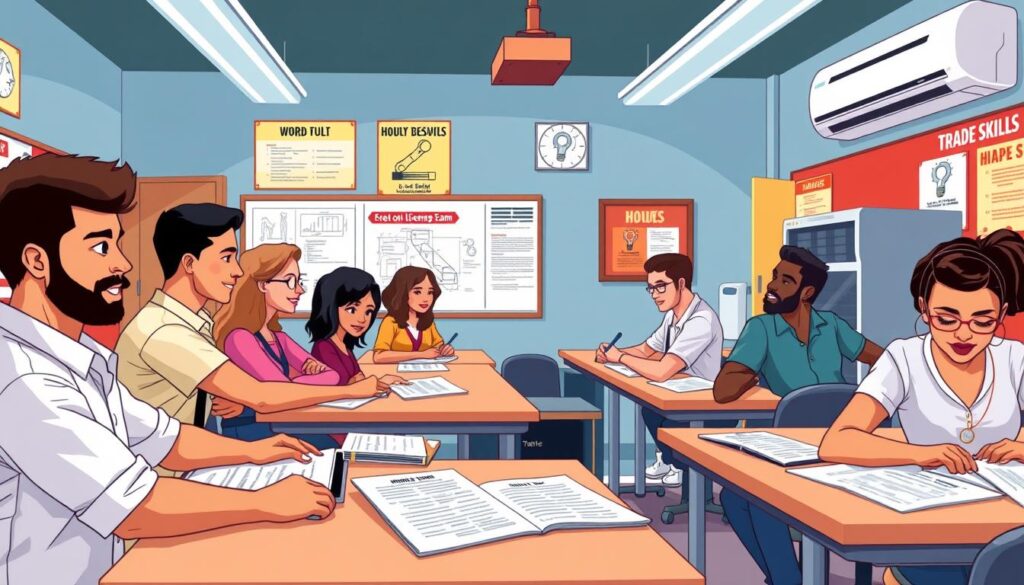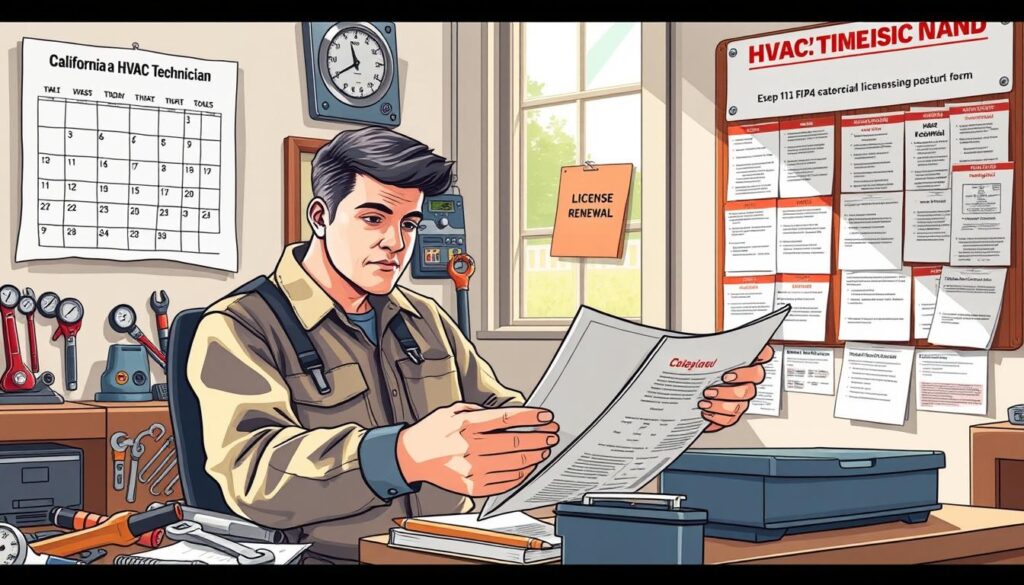Affiliate Disclosure
HVAC Guide Guys is a participant in the Amazon Services LLC Associates Program, an affiliate advertising program designed to provide a means for sites to earn advertising fees by advertising and linking to Amazon.
Does California Require HVAC License? If you’re thinking about a career in HVAC in California, knowing the licensing rules is key. Helen Hayes was right; even top experts began at the start. This guide will help you understand HVAC licensing in California, so you can start your path.
“The expert in anything was once a beginner.” – Helen Hayes

Key Highlights:
- California requires HVAC contractors to be licensed for work valued over $500, regulated by the Contractors State License Board (CSLB).
- HVAC technicians can either work under a licensed contractor or obtain their own C-20 HVAC contractor’s license.
- The C-20 license covers a wide range of HVAC-related activities, including installation, maintenance, and repair.
- Qualifying for a C-20 license requires meeting age, experience, and exam requirements, with the option to substitute experience with education.
- Obtaining a C-20 license involves various fees and costs, but it’s crucial for HVAC professionals to operate legally and capitalize on California’s high demand for HVAC services.
“Licensing ensures legal compliance, demonstrates expertise, and allows contractors to operate businesses, obtain insurance, pull permits, and bid on public projects.”
Table of Contents
Overview of California HVAC Licensing Requirements
If you’re thinking about becoming an HVAC technician in California, knowing the licensing rules is key. Getting the right california hvac certification and hvac technician license california is important. It shows you’re legal and skilled in your work.
Basic Eligibility Criteria
To get an HVAC license in California, you must be 18 or older. You also need a valid Social Security Number (SSN) or Individual Taxpayer Identification Number (ITIN).
Legal Requirements for HVAC Work
In California, you need a license for any HVAC job over $500. This rule makes sure HVAC pros are qualified. They can work safely and efficiently on your systems.
License Classifications
- The main HVAC contractor license in California is the C-20. To get it, you need four years of journeyman-level experience in the last ten years. You must also pass specific exams, pay fees, get EPA certification, pass a background check, and have a contractor’s bond and workers’ compensation insurance.
Understanding the california hvac certification and hvac technician license california rules can be tough. But knowing the basics is the first step to a great HVAC career in California.
Does California Require HVAC License: Understanding State Regulations
In California, HVAC contractors need a license for any job over $500. The Contractors State License Board (CSLB) oversees this. It ensures they follow the law, show their skills, and can run businesses and get insurance.
There are two paths for HVAC techs in California. They can work under a licensed contractor or get their own C-20 license. The C-20 license lets them do many HVAC jobs, like installing and fixing systems.
To get a C-20 license, you must be 18, have 4 years of experience in the last 10, and pass two exams. You can also meet the experience need with an apprenticeship or school training.
Getting a C-20 license has its costs, like fees for registration and exams. But, it’s key for HVAC pros to work legally in California. The state’s harsh weather makes HVAC services always in demand.
Types of HVAC Licenses and Certifications in California
If you’re a california hvac contractor or want to be one, knowing about HVAC licenses and certifications is key. You’ll need a C-20 Contractor License, but there are other certifications too. These can boost your career and pay.
C-20 Contractor License
The C-20 Contractor License is the main california hvac certification for HVAC work in California. It covers installing, maintaining, and fixing heating, ventilation, air conditioning, and refrigeration systems. To get this license, you must meet education, experience, and exam requirements from the Contractors State License Board (CSLB).
EPA Certification Types
You also need an EPA certification, in addition to the C-20 License. This ensures HVAC techs know how to handle and dispose of refrigerants. There are four EPA certifications: Type I for small appliances, Type II for high-pressure appliances, Type III for low-pressure appliances, and Universal for all appliances.
NATE Certification Options
Getting NATE (North American Technician Excellence) certification is not required but is very beneficial. NATE has various specialty certifications in HVAC areas like air conditioning and heat pumps. Having a NATE certification shows your skill and can open up more job opportunities and higher pay.
| Certification Type | Description | Typical Cost |
|---|---|---|
| C-20 Contractor License | Primary HVAC license required in California | $650 (includes $450 application fee and $200 initial license fee) |
| EPA Certification | Mandatory certification for handling refrigerants | $50 to $100 per certification type |
| NATE Certification | Optional certification demonstrating HVAC expertise | $150 to $300 per certification |
“Getting the right california hvac certifications and licenses is vital for california hvac contractors. It lets them work legally and offer top-notch services to their clients.”
California HVAC License Application Process
Getting an HVAC license in California is a detailed process. First, you need to fill out the “Application for Original Contractor License” form. This form costs $330 and is sent to the Contractors State License Board (CSLB). You must also show proof of work experience, pass a criminal background check, and get fingerprinted.
Once your application is okayed, you’ll need to pass a licensing exam. This exam has two parts: a test on HVAC systems and a Law & Business exam. It checks your knowledge of HVAC systems and California’s laws.
The whole process can take a few months. But, it’s worth it since 98% of students pass the state exam on their first try. Also, self-employed experience is accepted for obtaining an HVAC contractors license. And, a college degree can count as up to three years of HVAC experience.
To qualify for an HVAC license in California, you need 4 years of verifiable journey-level experience in the last 10 years. It’s best to apply for a license at least at 22 or 23 years old to meet the experience requirement.
| Key Highlights | Details |
|---|---|
| Application Timeline | 6-8 weeks for most students |
| Exam Pass Rate | 98% on first try |
| Experience Requirement | 4 years of journey-level experience within the last 10 years |
| Recommended Application Age | At least 22-23 years old |
Knowing the California HVAC license application process helps aspiring HVAC pros. It ensures a smooth path to getting their hvac license lookup california and california hvac license exam.
Explore Our HVAC Shop
Looking for top-rated HVAC tools, parts, and accessories? Visit our shop and find the perfect solution for your needs.
Visit the ShopExperience and Education Requirements
To become an HVAC professional in California, you need a lot of experience and education. The Contractors State License Board (CSLB) says you must have at least four years of experience in the last ten years. This is to qualify for the state’s licensing exam.
Work Experience Documentation
Applicants must show proof of their work experience. This can be pay stubs, W-2 forms, or letters from people who know their work in HVAC. You can use up to three years of experience for education, but you still need at least one year of real work experience.
Approved Educational Programs
California has schools that offer HVAC training. Places like San Diego City College, Sacramento City College, and Fresno City College are approved. These programs help meet the experience needed for an HVAC license.
Training Alternatives
There are also apprenticeships through unions or Joint Apprenticeship Training Committees (JATCs). These programs mix on-the-job training with classroom learning. They help you learn the skills needed for an hvac license requirements california.
California’s strict rules make sure HVAC workers are well-trained. This ensures they can provide safe and efficient services. This focus on quality and safety is key to the hvac license requirements california.
Explore Our HVAC Shop
Looking for top-rated HVAC tools, parts, and accessories? Visit our shop and find the perfect solution for your needs.
Visit the ShopHVAC Licensing Costs and Fees in California
Starting a career in HVAC in California means facing some financial hurdles. The licensing process has various fees and costs. Let’s explore the hvac licensing california expenses you’ll encounter.
The hvac licensing california application fee is $330. There’s also a $200 fee for sole owners or $350 for non-sole owners. Fingerprinting and background checks cost about $50.
The state requires a $25,000 contractor’s bond. This bond ensures HVAC professionals can meet their contractual duties. The bond’s annual cost is around $250.
Renewing your hvac licensing california every two years costs $450. This fee covers license administration and oversight.
Additionally, HVAC professionals may need EPA or NATE certifications. These certifications come with their own costs.
The initial hvac licensing california process can cost over $1,000. This doesn’t include education or insurance costs. It’s crucial to budget for these expenses when starting an HVAC career in California.
| Expense | Cost |
|---|---|
| Application Fee | $330 |
| Initial License Fee (Sole Ownership) | $200 |
| Initial License Fee (Non-Sole Ownership) | $350 |
| Fingerprinting and Background Check | $50 |
| Contractor’s Bond | $250 (annually) |
| License Renewal (every 2 years) | $450 |
These are just the hvac licensing california fees for the licensing process. You’ll also need to consider education, insurance, and certification costs. These are necessary to work as an HVAC professional in California.
Explore Our HVAC Shop
Looking for top-rated HVAC tools, parts, and accessories? Visit our shop and find the perfect solution for your needs.
Visit the ShopExamination Process and Requirements
To become an HVAC pro in California, you must pass a detailed exam. The Contractors State License Board (CSLB) runs these tests. They are held in places like San Bernardino, Oxnard, and San Diego.
Test Locations and Schedule
Exams are set up often, with dates announced three weeks ahead. You have 18 months to pass after your application is approved.
Exam Content Overview
The exam has two parts: a trade-specific section and a Law & Business section. You need to score 72% or better in each. You have 3.5 hours to finish the whole test.
Preparation Resources
The CSLB offers free study guides for the exams. These guides are detailed and help you understand the exam format. Using these resources can boost your chances of passing the california hvac license exam.

“Passing the California HVAC licensing exams is a crucial step towards a successful career in the industry. With the right preparation and resources, candidates can confidently take on this challenge and secure their place in the thriving HVAC market.”
| Exam Section | Duration | Questions | Passing Score |
|---|---|---|---|
| Trade Exam | 3.5 hours | 100 multiple-choice | 72% |
| Law & Business Exam | 2 hours | 50 multiple-choice | 72% |
Insurance and Bonding Requirements for HVAC Contractors
As an HVAC contractor in California, knowing the insurance and bonding rules is key. These rules help you run your business legally and keep your clients safe. They ensure your work meets high standards.
Contractor’s Bond
All HVAC contractors in California need a $25,000 contractor’s bond. This bond is a promise to follow state rules and finish projects on time. The bond amount went up to $25,000 in 2023, thanks to new laws.
Workers’ Compensation Insurance
If you have employees, you must have workers’ compensation insurance. It covers them if they get hurt or sick on the job. The cost depends on how much you pay your workers and your business’s risk level.
General Liability Insurance
While not required, general liability insurance is a good idea. It helps protect you from claims of injury or damage to others’ property. For HVAC businesses in California, it costs about $800 to $1,230 a year.
Having the right insurance and bonding is vital for HVAC contractors in California. It shows you’re serious about your work and care about your clients. It also helps protect your business.
The HVAC industry is always changing, so it’s important to keep up with insurance and bonding rules. A good risk management plan helps you deal with the challenges of the California market. It lets you offer top-notch service and protection to your clients.
Explore Our HVAC Shop
Looking for top-rated HVAC tools, parts, and accessories? Visit our shop and find the perfect solution for your needs.
Visit the ShopLicense Renewal and Continuing Education
If you’re an HVAC contractor in California, you’ll need to renew your license every two years. The renewal fee is $450 if you submit it before the expiration date. However, late renewals come with additional fees. While California doesn’t mandate continuing education for license renewal, staying current with industry certifications like NATE can greatly benefit your career prospects.
Maintaining your EPA certification and staying informed about changes in HVAC regulations and technologies is crucial. Continuous learning and professional development will not only help you provide better service to your clients but also enhance your overall expertise in the field.
| Requirement | Details |
|---|---|
| License Renewal Frequency | Every 2 years |
| Renewal Fee (on-time) | $450 |
| Continuing Education | Not mandatory, but recommended to maintain NATE and EPA certifications |
| Renewal Deadline | Before the expiration date |
| Late Renewal Fees | Additional fees apply |
By staying up-to-date with the latest hvac license renewal california requirements, you can ensure your HVAC business remains compliant and competitive in the industry. Take the necessary steps to renew your license on time and consider pursuing additional certifications to enhance your expertise.

“Continuous learning and professional development are essential for HVAC contractors in California to maintain their expertise and provide the best possible service to their clients.”
Conclusion
California has strict rules for HVAC licenses. This ensures top-notch work from professionals. To legally work on HVAC projects worth over $500, you need a C20 License. This requires experience, passing exams, and meeting legal standards.
The process might seem long, but it’s good for everyone. Licensed contractors get legal status, make more money, and run their own businesses. For new HVAC pros, getting licenses like EPA Section 608 and NATE shows they’re serious about quality and skill.
If you’re in HVAC, knowing about does california require hvac license and hvac licensing california is key. By getting the right licenses and certifications, you ensure your work is top-notch. This way, you give your clients the best, safe, and efficient HVAC solutions.
